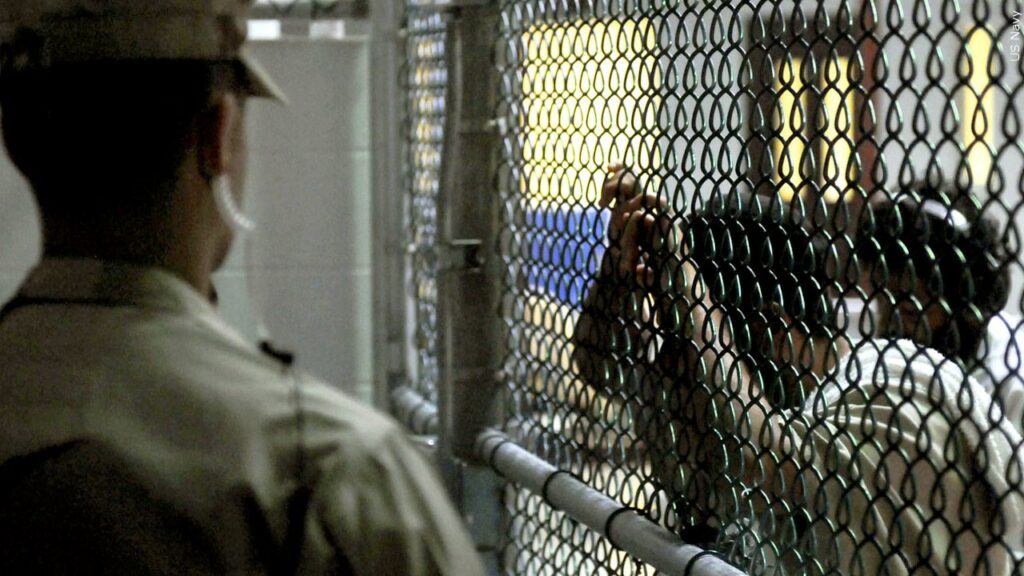by Brett Wilkins, CommonDreams.org
Twenty-one years after the George W. Bush administration opened the U.S. military prison at Guantánamo Bay, Cuba—and 13 years after then-President Barack Obama signed an executive order for its closure—more than 150 groups on January 11 implored the Biden administration to “act without delay” to close the notorious lockup.
“Among a broad range of human rights violations perpetrated against predominantly Muslim communities over the last two decades, the Guantánamo detention facility—built on the same military base where the United States unconstitutionally detained Haitian refugees in deplorable conditions in the early 1990s—is the iconic example of the abandonment of the rule of law,” the groups said in a letter to President Joe Biden. “The Guantánamo detention facility was designed specifically to evade legal constraints, and Bush administration officials incubated torture there.”

Since 2002, 779 men and boys have been held at Guantanamo, many of them tortured, and nearly all without ever being charged or tried. According to retired U.S. Army Col. Lawrence Wilkerson—who served as chief of staff to Bush-era Secretary of State Colin Powell—Bush, along with his vice president and defense secretary, Dick Cheney and Donald Rumsfeld, knew that most of the Gitmo prisoners were innocent, but kept them locked up for political reasons.
Obama—whose vice president was Biden—issued executive orders after entering the White House in 2009 that were meant to end torture and close Gitmo. However, Obama—who was blocked by Congress from implementing the prison’s closure—broke a campaign promise and the law by actively shielding Bush-era officials from accountability while torture continued at Gitmo.
“Thirty-five remain there today, at the astronomical cost of $540 million per year, making Guantánamo the most expensive detention facility in the world,” the groups’ new letter states. “Guantánamo embodies the fact that the United States government has long viewed communities of color—citizens and noncitizens alike—as a security threat, to devastating consequences.”
“This is not a problem of the past,” the signers stressed. “Guantánamo continues to cause escalating and profound damage to the aging and increasingly ill men still detained indefinitely there, most without charge and none having received a fair trial. It has also devastated their families and communities. The approach Guantánamo exemplifies continues to fuel and justify bigotry, stereotyping, and stigma. Guantánamo entrenches racial divisions and racism more broadly, and risks facilitating additional rights violations.”
The New York-based Center for Constitutional Rights, which represents three of the 21 Guantánamo prisoners who have been cleared for release and which signed the letter, said in a statement:

“We should not be marking another year in the life of this ignominious product of U.S. imperialism and racism as we have every January since the first anniversary of its opening in 2002. Yet we will succeed in shutting it down. Despite the lack of will of presidents who have claimed to support closure and the express desire of some political leaders to keep the prison open forever, the prison population has shrunk by 95 percent from its peak—the result of pressure from a broad coalition from around the globe, including the imprisoned men themselves, their families, and Guantánamo survivors who have been released.”
Asked shortly after taking office whether the Biden administration will move to close Gitmo, then-White House Press Secretary Jen Psaki said “that certainly is our goal and our intention.”
However, the Biden administration has taken few steps toward that goal, while spending millions of dollars on a new secret courtroom at the prison.
Last year, the administration released four Guantánamo prisoners, including 75-year-old Saifullah Abdullah Paracha, the oldest person ever imprisoned there.
“It is long past time for both a sea change in the United States’ approach to national and human security and a meaningful reckoning with the full scope of damage that the post-9/11 approach has caused,” the groups’ letter argues. “Closing the Guantánamo detention facility, ending indefinite military detention of those held there, and never again using the military base for unlawful mass detention of any group of people are necessary steps towards those ends.”













